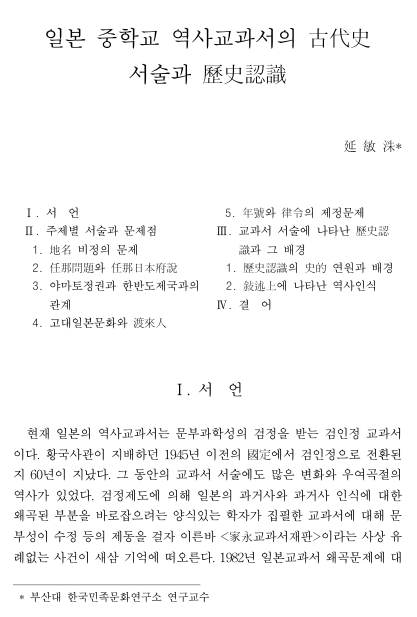연민수, 2005, 〈일본 중학교 역사교과서 고대사 서술과 역사인식〉, 《한국사연구》 129, 한국사연구회.

Ⅰ. 서언 Ⅱ. 주제별 서술과 문제점 1. 地名 비정의 문제 2. 任那問題와 任那日本府說 3. 야마토정권과 한반도제국과의 관계 4. 고대일본문화와 渡來人 5. 年號와 律令의 제정문제 Ⅲ. 교과서 서술에 나타난 歷史認識과 그 배경 1. 歷史認識의 史的 연원과 배경 2. 敍述上에 나타난 역사인식 Ⅳ. 결어
The descriptions found in the Japanese history textbooks for middle school students have tended to promote Japan's supposed superiority. In particular, the New History Textbook published by Husosha Publishers includes errant descriptions of historical truths, as well as elitist and self-righteous unilateralism-based approaches to history. The ethnocentric ideology evident in these Japanese history textbooks has its origins in the unique Japanese mindset stemming from the political ideology of the imperial system which was established in the 8th century. In order to establish this imperial system-based ideology, Japan compiled the Nihon shoki (日本書紀, Chronicles of Japan) which was designed to justify the legitimacy and eternal nature of the imperial system. This work included the fabrications that the ancient Korean kingdoms were tributary states of Japan and distorted perceptions of history. This kind of beliefs first formed in the ancient era were passed down from generation to generation and were eventually consolidated as the Japanese ruling class belief in the political ideology of Hwangguk sakwan (皇國史觀,), which emerged at the end of 19th century when the Restoration of the Emperor was carried out. These errant descriptions of the relationship with ancient Korean kingdoms and Japan's perception of history is based on a long-enduring attempt to distort history. This kind of perception has also influenced their descriptions of cultural history. Totally ignoring the roles of the Korean peninsula, Japan has belittled the culture which developed in Korea by positioning itself as the conveyor of Chinese culture. Pride in one's country and the belief in the inherent superiority of one's national history are two totally different things. Such a self-righteous perception causes the regression of history, and leads to an unsure future. In this regards, in order to actualize peace and prosperity in East Asia, there is a need to educate future generations to have a more desirable perception of history.


의견쓰기
0 개의 의견이 있습니다.